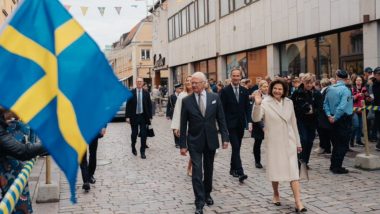Copenhagen, June 6: Sweden's royal family has taken part in ceremonies Tuesday marking 500 years since the Scandinavian country emerged as an independent nation. King Carl XVI Gustaf and Queen Silvia were first in the town of Strangnas, 60 kilometers (37 miles) west of the Swedish capital, Stockholm, where Gustav Vasa was elected king of Sweden in 1523.
His election ended the so-called Kalmar Union with Norway and Denmark, which had endured since the 14th century. Sweden was eventually transformed from an elective monarchy into a hereditary monarchy, where the crown would be passed on from father to son.
On Tuesday morning, the royal couple and Prime Minister Ulf Kristersson arrived at the Gothic-style cathedral, built between 1291 and 1340, which is in the heart of Strangnas, a quiet town with a population of about 13,000.
In Stockholm, Crown Princess Victoria appeared in national dress, and her husband, Prince Daniel, opened the gates of the downtown palace with free entry to the castle and its museums as is customary on June 6, Sweden's National Day.
Sweden National Day 2023 Celebration:
Today we celebrate Sweden’s quincentenary – that’s 500 years! 🇸🇪
This year truly is a jubilee year for Sweden: it also marks 50 years on the throne for HM King Carl XVI Gustaf, Sweden’s current and longest reigning monarch.#celebratewithsweden #sweden500 #gladnationaldag pic.twitter.com/arcAMzYPhj
— Sweden in Vietnam (@SwedeninVN) June 6, 2023
In 1980, the order of succession changed, making Victoria, the oldest of King Carl XVI Gustaf's three children, first in line to the throne. To conclude the day, the monarch will ride from the royal palace in a horse-drawn carriage through part of downtown Stockholm to Skansen, an open-air museum, showcasing the whole of Sweden with houses from every part of the country.
Carl Gustaf who ascended the throne on Sept. 15, 1973 and is the longest-reigning monarch in Swedish history, will give a speech there. Later this year, the king, aged 77, will celebrate 50 years on the throne. Sweden's royal family is popular and the monarchy enjoys widespread support, despite the egalitarianism that otherwise characterises society in the Nordic country.
(The above story is verified and authored by Press Trust of India (PTI) staff. PTI, India’s premier news agency, employs more than 400 journalists and 500 stringers to cover almost every district and small town in India.. The views appearing in the above post do not reflect the opinions of LatestLY)













 Quickly
Quickly


